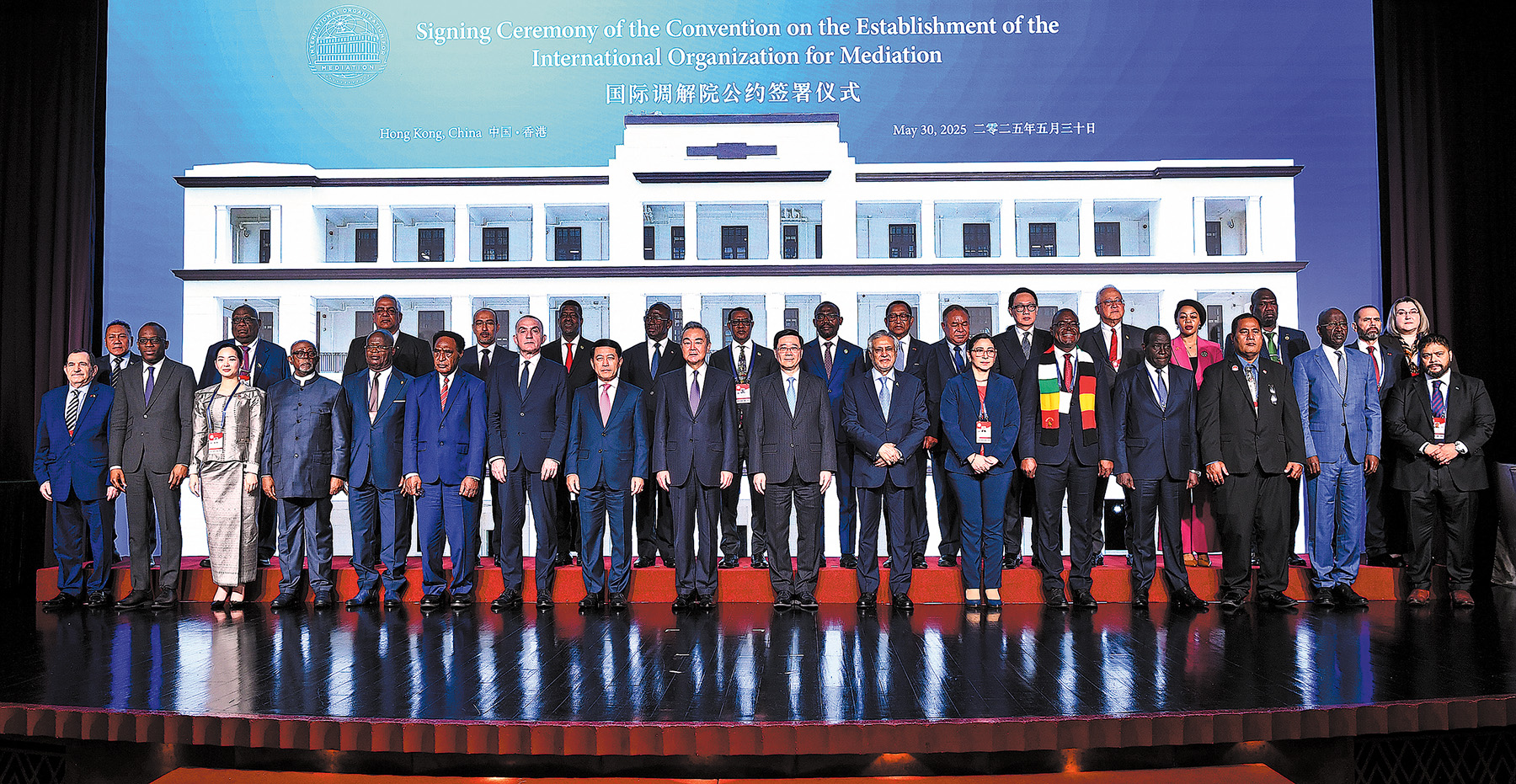Officials welcome groundbreaking launch of International Organization for Mediation in Hong Kong

The world’s first intergovernmental body focusing on mediation will offer win-win solutions for settling global conflicts and help build more harmonious, fair, and cooperative international relationships, according to senior government officials.
Foreign Minister Wang Yi and about 400 high-level representatives from 85 countries and nearly 20 international organizations, including the United Nations, gathered in the Hong Kong Special Administrative Region on May 30 to attend the signing ceremony of the Convention on the Establishment of the International Organization for Mediation, witnessing the birth of the world’s first intergovernmental mediation body.
At the ceremony, 32 countries signed up for the convention on-site, becoming the founding members of the mediation body.
Dedicated to resolving international disputes through mediation, the body will be fully operational by the end of this year or the beginning of 2026.
The organization’s headquarters will be established in the Old Wan Chai Police Station in Hong Kong, premises that are currently under renovation.
Wang noted in his opening speech that the launch coincided with the 80th anniversaries of both the victory in the World Anti-Fascist War and the founding of the United Nations. The preamble of the UN Charter states that countries should live together in peace as good neighbors and unite to maintain international peace and security, said Wang.
He said that China has consistently advocated for resolving differences through mutual understanding, building consensus through dialogue, promoting development through win-win cooperation, and crafting forward-looking solutions — principles that underpin the nation’s distinctive approach to addressing global conflicts.
Wang said the organization’s establishment serves as an important legal public good for improving global governance and fulfills the purposes and principles of the UN Charter. It also embodies the wisdom of harmony and coexistence, and complements existing international dispute resolution mechanisms, such as litigation and arbitration, he added.
Hong Kong’s return to the motherland is a successful example of resolving international disputes through peaceful means, Wang noted.
Hailing the organization as a milestone in the history of international relations, Wang called on the international community to support the development of the mediation body and help build a fair, flexible and inclusive global mediation system.
Hong Kong Chief Executive John Lee Ka-chiu said that the organization’s launch comes as the world faces mounting geopolitical tensions, protectionism, and unilateralism, making the effective, accessible, and peaceful resolution of disputes more essential than ever.
“It is dialogue — not division — that restores balance,” said Lee.
He added that Hong Kong’s well-respected legal system, along with its multilingual legal professionals who are well-versed in international rules and practices, helps to position the SAR as a preferred venue for dispute resolution.
At the signing ceremony, Mohammad Ishaq Dar, Pakistan’s deputy prime minister and foreign minister, said the organization not only heralds a new era for international mediation but also embodies a crucial multilateral institution upholding diplomatic reconciliation principles.
Amon Murwira, Zimbabwe’s minister for foreign affairs and international trade, commended China’s exemplary leadership in formulating the convention, and noted its vital significance in maintaining global stability amid complex geopolitical tensions.
Anna Joubin-Bret, secretary of the UN Commission on International Trade Law, said that developing nations show particular interest in using mediation to settle disputes because of its cost-efficiency and mutually beneficial outcomes, which will transform potential “lose-lose” scenarios into opportunities for sustained partnership.
Following the May 30 signing ceremony, a high-level international mediation forum was hosted.
It focused on relevant topics such as the mediation of disputes among countries and the mediation of international investment and commercial disputes.
Contact the writers at stephyzhang@chinadailyhk.com


